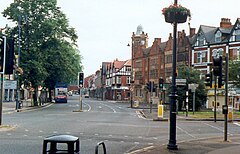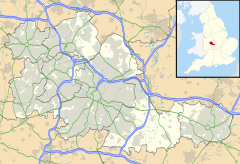This article needs additional citations for verification. (June 2009) |
Moseley (/ˈmoʊzliː/ MOZE-lee) is a suburb of south Birmingham, England, three miles (five kilometres) south of the city centre.
| Moseley | |
|---|---|
 Moseley centre | |
Location within the West Midlands | |
| OS grid reference | SP077832 |
| Metropolitan borough | |
| Shire county | |
| Metropolitan county | |
| Region | |
| Country | England |
| Sovereign state | United Kingdom |
| Post town | BIRMINGHAM |
| Postcode district | B13 |
| Dialling code | 0121 |
| Police | West Midlands |
| Fire | West Midlands |
| Ambulance | West Midlands |
| UK Parliament | |
It is located within the Moseley ward of the city, in the constituency of Hall Green and Moseley. Historically it lay within Worcestershire.[1]
History
editMoseley was listed in the Domesday Book of 1086 as Museleie.[2]
St. Mary's Church, Moseley was licensed by the Bishop of Worcester (authorised by Pope Innocent VII) in February 1405, and the 600th anniversary was celebrated in 2005 with a series of special events. In 2012 the church bells, which had been named as the worst sounding in the country, were replaced. Moseley itself developed around a Victorian shopping area known as Moseley Village.
Moseley Hall was rebuilt in parkland in the early 1600s, and rebuilt again by 1795 after being set on fire during rioting in 1791. It was donated in 1891 to the City of Birmingham by Richard Cadbury and now forms part of Moseley Hall Hospital.
Spring Hill College (Moseley School), a Gothic revival construction built in 1857, is located in the south of the district. Former pupils include comedian Jasper Carrott and musician Bev Bevan of the Electric Light Orchestra.
St Anne's Church, Moseley was opened in 1874.
Moseley was served by Moseley railway station from 1867 to 1941. It was opened by the Midland Railway on the Camp Hill line. A previously named Moseley Station on the same line changed its name to Kings Heath Station upon the opening of the station.[3]
Moseley and the surrounding areas were much developed after 1910, being built upon the once extensive farm land that was predominant in this area. The new properties being mostly of large houses, designed to cater for the Edwardian middle-class families that settled in the suburbs surrounding Birmingham's industrial centre. These large houses relied upon at least one servant or "tweeny" as they were often termed, to help the lady of the house run the household. With the advent of the First World War, staff were hard to find to maintain houses of this size. The heating bills and high maintenance made them unpopular after the war and many were split into flats to cater for the requirements of the expanding working population who moved from the city centre as extensive redevelopment took place in the 1960s.
In some respects Moseley and the surrounding area suffered a serious decline in the last part of the 20th century. Much property fell into neglect, and problems with crime, drugs and prostitution became commonplace in the areas bordering Balsall Heath. During this same period, however, with a great deal of cheap accommodation on offer, it is arguable that Moseley also enjoyed its most creative and cosmopolitan phase as the focus of artistic and student communities. In 1970s, the small triangular shaped green in the heart of Moseley village, which was then home to the underground public toilets, was a convenient meeting place for local youth, and was known as "Bog Island".
Local band Ocean Colour Scene were active in the mid-1990s British Britpop–indie scene with songs such as "The Riverboat Song", inspired by locations within the suburb of Moseley. Their most successful album (in terms of weeks on chart) was Moseley Shoals.[4] Moseley is also the birthplace of Nick Rhodes of Duran Duran.
The politician Joseph Chamberlain had his Birmingham residence at Highbury, on the edge of Moseley. The property was entrusted to the city after Chamberlain's death and is currently used as a conference venue and location for civil ceremonies.
Literature
editJ. R. R. Tolkien spent his early years in Moseley, living close to Sarehole Mill in Hall Green before moving to the site now occupied by Shades Music off the Alcester Road. Sarehole Mill is believed to have been his inspiration for the tranquil Shire in The Lord of the Rings. He also drew inspiration from Moseley Bog for the landscape of Middle-earth.[5]
Sport
editMoseley has a rich history of success in Rugby Union. Its most famous team is Moseley Rugby Football Club, who were one of Europe's best teams in the late 1960s to the 1980s. Notable players include Sam Doble, J. F. Byrne, Peter Cranmer, Alain Rolland, Mike Teague and Victor Ubogu.
The Moseley Wanderers team of 1900 won the Silver Medal in the Rugby Union competition at the 1900 Olympics.
Present
editA monthly Farmers' Market in Moseley - set up by the Moseley Neighbourhood Forum- has won various awards including best FARMA Certified Urban Farmers' Market 2009 and in 2009 local farmer Dominic Butler won the Most Unique Produce award with his micro blue beetroots. Similarly, Moseley has a well defined and established community spirit and ethos, exemplified by Moseley Neighbourhood Forum - a neighbourhood forum - that works to develop the area for the betterment of everyone. The Moseley Society exists to protect the heritage of the area; meetings of the Society discuss and debate a wide range of local issues and the interests of its residents.
The Moseley Community Development Trust (CDT) invests in the social and physical capital of the area. Established with funding from charitable trust funds and with the support of the Moseley and Kings Heath Ward Committee, the CDT is now managing a series of initiatives to improve the environment of Moseley.[6]
It has its own monthly magazine, Moseley B13 (formerly Birmingham 13), reporting on local events and personalities. It has been printing as of May 1973[update].[7]
A group of volunteers have formed Moseley in Bloom (MiB). Much like the Moseley Community Development Trust, the group undertake many projects which look at the greener issues around Moseley. Many projects take place throughout the year to enhance the landscape of Moseley as well as renovate dilapidated areas.
Every summer Moseley hosts Moseley Festival,[8] a festival of arts and culture that sees people in the community come together and hold a series of music, art, food, cultural and sporting events.
Moseley Folk & Arts Festival[9] happens later in the year, and attracts big names from the world of folk. Moseley Jazz, Funk & Soul Festival[10] takes place in Moseley Park during the summer as well. Moseley also has its own literary festival, Pow-Wow LitFest,[11] which has taken place annually at the Prince of Wales pub as of 2011[update].
Moseley is also home to many pubs, restaurants and cafés.
In 2015 Moseley was named as the "best urban place to live" by The Sunday Times, with the newspaper citing its 'Arts and Crafts', 'Bohemian culture' and 'Victorian Architecture' as reasons to live in the suburb.[12] This award followed its being highlighted by The Guardian in 2013 as a place to move, with similar reasons being cited.[13]
Education
editMoseley has two secondary schools, Moseley School, a language college and Queensbridge School, an Arts College. It also has several Primary schools such as Moseley C of E Primary School a one form entry school that has connections with St. Mary's Church and Park Hill Primary School on Alcester Road and St Martin de Porres Catholic Primary School.
Moseley is also home to Uffculme School, an all age special school for children on the autism spectrum. It is also home to James Brindley Academy's Willows Centre which provides education to inpatients at Parkview Clinic.
Moseley also has Fox Hollies School.
Notable residents
editMany people who have been born, lived or worked in Moseley have made important contributions, a few of the more high-profile ones are:
- Kabir Ali, Worcestershire & England cricketer
- Edward Bach, doctor, best known for developing a range of remedies called the Bach flower remedies
- Dan Bull, rapper and songwriter[14]
- Ali Campbell, singer in UB40[15]
- Austen Chamberlain MP, statesman, Lord Mayor of Birmingham, philanthropist[16] and Nobel Peace Prize winner
- Neville Chamberlain, Prime Minister, MP and Lord Mayor of Birmingham (declared World War II)[17]
- Carl Chinn, historian, radio presenter, newspaper columnist, and media personality
- Alan Cottrell, metallurgist and physicist
- Fyfe Dangerfield, musician, solo artist and lead singer of the Guillemots[18]
- Roger Jon Ellory, author[19]
- Simon Fowler, musician and lead singer of Ocean Colour Scene
- Claudia Jessie, actress
- Trish Keenan, songwriter, musician and lead singer of Broadcast
- Frederick W. Lanchester, pioneer of the motor car
- Joanne Malin, TV presenter, co-presenter of Central Tonight
- Herbert Mason MC, film director, producer, actor, stage manager, choreographer, production manager and army officer in World War I[20][21]
- Nick Rhodes, keyboardist in Duran Duran
- Brian Travers, saxophonist in UB40[22]
- J. R. R. Tolkien, author of The Hobbit and The Lord of the Rings
See also
editReferences
edit- ^ "Great Britain and Ireland - interactive county map".
- ^ "Place name: Moseley, Birmingham, Warwickshire, Worcestershire Folio: 172r Great..." nationalarchives.gov.uk.
- ^ "Moseley Station". railaroundbirmingham.co.uk.
- ^ Ocean Colour Scene full Official Chart History, Official Charts Company, retrieved 8 July 2016
- ^ Middleton, Christopher (15 December 2007). "Birmingham Lord of the Rings Tour". The Daily Telegraph. London.
- ^ "Moseley Community Development Trust". moseleyCDT.com.
- ^ "Moseley B13 Magazine". moseleyb13.com.
- ^ "Moseley Festival". moseleyfestival.org.uk.
- ^ "Moseley Folk".
- ^ "Mostly Jazz, Funk & Soul Festival -8th - 10th July 2016 -Birmingham, UK". Mostly Jazz, Funk and Soul Festival.
- ^ "Pow-Wow Litfest 2013". pow-wow.org.uk.
- ^ "The winner: Birmingham, Moseley". The Sunday Times. Archived from the original on 2 April 2015. Retrieved 1 February 2016.
- ^ "Let's move to: Moseley, Birmingham". The Guardian. 29 November 2013. Retrieved 1 February 2016.
- ^ Archived at Ghostarchive and the Wayback Machine: "Let's walk and talk". YouTube. 8 November 2014.
- ^ "UB40 Homepage". Archived from the original on 14 December 2014.
- ^ "Joseph Chamberlain, Moseley CDT".
- ^ "Number10.gov.uk". Archived from the original on 2 April 2012.
- ^ "Fyfe Dangerfield, Moseley Folk Festival". Archived from the original on 24 July 2012.
- ^ "RJ Ellory Profile".
- ^ "Herbert Mason". explore.bfi.org.uk. Archived from the original on 16 July 2012. Retrieved 19 March 2015.
- ^ "Supplement to the London Gazette, 14 November 1916". The Gazette. The London Gazette. 14 November 1916. p. 11060. Retrieved 19 March 2015.
For conspicuous gallantry in action. He brought up machine-guns under intense fire, and organised the machine-gun section defence of each object as gained, displaying great courage and initiative. He greatly assisted our holding the position when gained
- ^ "UB40 Homepage". Archived from the original on 14 December 2014.
